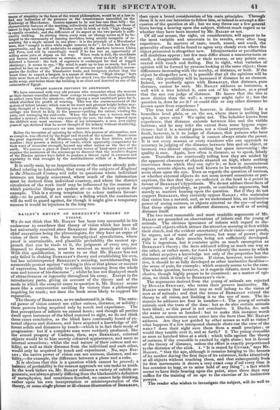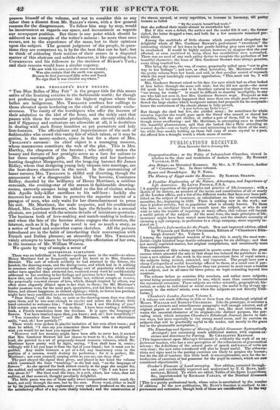BAILEY'S REVIEW OF BERKELEY'S THEORY OP VISION.
WE do not think that Mr. BAILEY has been very successful in his endeavour to overthrow that theory of vision which has been all but universally received since BERKELEY first promulgated it ; the chief exceptions being the phrenologists, for they have an organ of vision of their own. In these metaphysical speculations, where proof is unattainable, and plausible probability the nearest approach that can be made to it, the judgment of every one, not disposed to dogmatize, must be received as merely an opinion. With this qualification, it seems to us that Mr. BAILEY has not only failed in shaking BERKELEY'S theory and establishing his own, but has misinterpreted BERKELEY'S meaning, notwithstanding his memorable protest against "sticking in this or that phrase or manner of expression, but candidly to collect his meaning from the whole sum and tenour of his discourse " ; 'whilst he has not displayed much of attractiveness or ingenuity throughout his essay. Except in the introductory parts, giving an account of the theory and of the mode in which the essayist came to question it, Mr. BAILEY seems more like a controvertist cavilling for victory than a philosopher inquiring for truth, nor does the book seem likely to support his reputation. The theory of BERKELEY, as we understand it, is this. The natural power of vision cannot see either outness, distance, or solidity ; these powers being acquired only by touch and experience. The first perceptions of infants we cannot learn ; and though all parties dwell upon instances of the blind restored to sight, we do not think these cases conclusive, as the blind have continually heard of external objects and distance, and have acquired a knowledge of different solids and distances by touch—which is in fact their mode of progression : but if a complete man were suddenly produced;' like the armed progeny of Cadmus, then says BERKELEY, external objects would be to him merely coloured appearances, and seem as internal sensations whilst the real nature of their "outness and solidity, as well as their distance from the individual and each other, would only be acquired by touch and experiment. No, says BAI• LEr ; the native power of vision can see outness, distance, and solidity,—for example, the difference between a plane and a cube. It is obvious that this is a question which cannot be proved; a balance of probability is the nearest approach we can make to truth. In the work before us, Mr. BAILEY adduces a variety of subtile arguments, not always greatly differing from the blacksmith's definition of metaphysics, and sometimes founded, we cannot help thinking, rather upon his own interpretation or misinterpretation of the theory, or some single phrase or ill-chosen illustration of BERKELEY, than upon a broad consideration of his main principles. Through these it is not our intention to follow him, or indeed to attempt a discussion of the question at all ; but we may throw out a few general hints having a bearing upon the subject, without much regard as to whether they have been mooted by Mr. BAILEY or not.
Of all our senses, the sight, on consideration, will appear to be the most variable and uncertain in its results, even after long experience. In matters of taste, touch, sound, and smell, the generality of men will be found to agree very closely even where the object presented is altogether new. Idiosyncracies or peculiarities will doubtless appear ; but few men differ about a nauseous taste or smell, a disagreeable sound, or their reverse, or any points connected with touch and feeling. But in sight, what varieties of opinion will be formed by persons looking at the same object ; these differences increasing with the novelty, or distance, or both. If the object be altogether new, it is possible that all the opinions will be
wrong : this possibility will be increased if distance be an element. Indeed, we perfectly agree with BERKELEY, that distance, pure distance cannot be seen. Mr. BAILEY adduces as instances, a wall with a tree behind it, seen out of his window, as a proof that the eye can judge of distance. He knows that the tree is more distant than the wall; a stranger might infer it ; but the question is, does he see it? or could this or any other distance be known apart from experience ?
The true test of distance, however, is distance itself. In a boundless level plain or on the sea, where there is nothing but space, is space seen We opine not. The beholder knows from
experience, that distance extends between him and the visible horizon; and he may infer the extent from some bygone expe rience: but it is a mental guess, not a visual perception. So dif
ficult, however, is it to judge of distance, that persons who have passed their life in estimating it cannot always attain the power. It is not every seaman or every wanderer who can approach to accuracy in judging of the distance between him and an object, or between two distant objects, nothing but space intervening : the quality is rare. Again, how often is distance, so to speak, falsely seen. Travellers are continually telling how they are misled by the apparent closeness of objects situated on high, where nothing intervenes from which they can infer it ; or how in mountainous regions, remote objects, and well known to be wonderfully remote, seem close upon the eye. Even as regards the question of outness, or whether external objects do not seem inward sensations or perceptions, the fact that they are reflected in the head is a priori in favour of BERKELEx's hypothesis. We do not adduce these facts of experience, or physiology, as proofs, or conclusive arguments, but merely as matters bearing upon the question. But if they do not
support BERKELEY, they certainly oppose &mar ; who maintains that vision has a natural, and, as we understand him, an instinctive power of seeing outness, or objects external to the eye—of seeing that those objects are at different distances, as well as of seeing distance itself.
The two most reasonable and most readable arguments of Mr. BAILEY are grounded on observations of infants and the young of
animals. The obvious ignorance of infants with regard to distance—all objects which attract the attention seeming at first within their clutch, and the evident uncertainty of their vision—are proofs, he argues, not of want of experience, but want of power ; their sight as well as their muscles being not sufficiently developed. This is ingenious, but it contains quite as much assumption as
BERKELEY'S theory ; the facts adduced telling as much one way as the other, or rather more, for touch is evidently the means by which
the infant acquires a knowledge not only of the properties but the
distances and solidity of objects. If vision, however, were instinctive, it should be as fully developed as other instinctive faculties— the sense of pain, for example ; which scarcely seems to be the case. The whole question, however, as it regards infants, must be inconclusive, though highly proper to be examined: as a matter of opinion, we think it tends to BERKELEY'S view. The arguments derived from the young of animals are rejected by DUGALD &swear, who terms their powers instinctive. Mr. BAILEY asserts that instinct may as well belong to the vision of man as of animals ; and that the terms of BERKELEY extend the theory to all vision, not limiting it to the eye of man. The in
stances be adduces are four in number—l. The young of certain animals seek the teats of the dam: but so do also certain animals born blind ; so this proof is not conclusive. 2. Ducks, Sze. seek the water as soon as hatched : but to make this instance worth
much, more minuteness must enter into the facts than Mr: BAILEY adduces. Are they not guided by other senses as well as vision ?
what happens if a low interposed obstacle shuts out the view of the water ? does their sight save them from a small precipice ; or would they tumble over it, and so forth ? 3. The young crocodile as soon as hatched bites at a stick : which tells against the theory of outness, if the crocodile is excited by sight alone i • but in favour of the theory of distance, unless the effort is exactly proportioned
to the distance of the stick. 4. "It is stated by COMB," bays Mr. BAILEY, ." that the ape, although it remains hanging to the breasts of its mother during the first days of its existence, looks 'attentively
at all objects without touching them, and that subsequently from its first movements it shows a very exact coup d'ceil every time it has occasion to leap; or to seize hold of any thing" ; a fact Which seems to have little bearing upon the point, since three days may suffice for the training of an ape to the exercise of its instinctive powers. The reader who wishes to investigate the subject, will do well to
possess himself of the volume, and not to consider this as any other than a dissent from Mr. Baumr's views, with a few general reasons for the disagreement. To follow him step by step, would be inconvenient as regards our space, and inconsistent as regards our newspaper position. But there is one point which should be adduced as an example of the writer's animus : he more than once recurs, not to the experience of the mass, but to their opinions upon the subject. The general judgment of the people, in questions they are competent to, is by far the best that can be had ; but to think of adducing their notions of their senses in a disputed matter of this abstruse and subtile character, is like appealing from CornaNicos and his followers to the decision of BYRON'S Turk; and their reasons would have a similar cogency.
"lie saw with his own eyes the moon was round;
Was also certain that the earth was square,
Because he had journeyed fifty miles and found
No sign that it was circular anywhere."



























 Previous page
Previous page